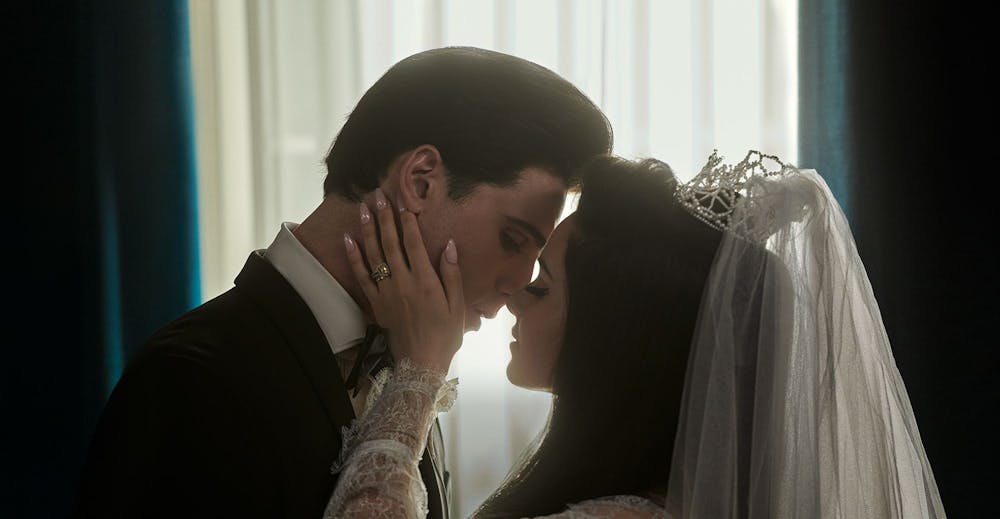While it seems that there is nothing new under the sun to discover about Elvis Presley, there is one thing: Priscilla. Sofia Coppola’s latest film, “Priscilla,” explores the controversial relationship between the Presleys — from the moment they meet to their divorce.
There were small moments throughout the film — Elvis’s stuffed tiger, the acid trip, Priscilla’s white dog — where I could feel the audience’s reactions beside me in the theater. We all laughed at the superficiality of Graceland, became frustrated with the substance abuse and smiled whenever that scruffy white dog appeared on screen.
Highlighting a prominent but forgotten female figure of popular culture is a job for no one other than Sofia Coppola. Like her most recent film’s titular character, Coppola too has been laid victim to the “descriptive clause.” Often introduced as Sofia Coppola, daughter of Francis Ford Coppola — Coppola tells the story of another woman rarely acknowledged as having any importance in her own right. Telling Priscilla’s story without coming across as just some movie about Elvis’s wife could only ever be fit for a director of Coppola’s caliber (the director has the films “Lost in Translation” and my personal favorite, “Marie Antoinette,” under her belt.) Coppola manages to balance portraying Priscilla as a character independent from Elvis while also acknowledging the impact he has had on her life.
And yet there is something missing from “Priscilla.” The film’s narrative is shallow, with Coppola taking your hand across that pool of water, letting your palm just barely graze against the surface, never going a fraction deeper but always on the precipice with the knowledge that she could take viewers somewhere further in the story. “Priscilla” contains some bomb just waiting to be dropped that never is. The film’s greatest fault is that there is no way to tell if the bomb actually exists.
Underneath the shiny exterior of Coppola’s beautiful cinematic vision, the story itself falls flat. While I can’t blame it entirely on the source material of Priscilla Presley’s autobiography, “Elvis and Me” (I haven’t read it), I can say that within the film’s plot there is little sense of urgency or consequence.
Priscilla’s parents seem overwhelmingly unconcerned with what happens to her. They give only a few feeble attempts at questioning Elvis’s intentions until they give in and let Priscilla move in with Elvis’s family (of course you can go to Tennessee and live with your much older boyfriend, honey!)
Furthermore, the relationship between Elvis and Priscilla remains underdeveloped. It’s not clear why Elvis was so drawn to Priscilla, other than the fact that she was a child. This brings up more uncomfortable and unanswered questions regarding Elvis’s character. The film also lays faulty groundwork as to why the two like one another in the first place. Coppola justifies their chemistry as a byproduct of Priscilla’s starstruckness. But this basic explanation leaves viewers to fill the gaps with a naive, Romeo-Juliet understanding of their relationship.
These gaps in understanding can most easily be blamed on the film’s simultaneous greatest strength and weakness: Priscilla’s perspective. While I am not arguing that Priscilla’s view isn’t the crux of the film, it is incredibly limiting in how her perspective refuses to acknowledge some of the more touchy subjects of the time, like the racism of the 60’s or statutory implications of their relationship.
Unfortunately, reality is often not stranger than fiction. Coppola’s adaptation from biographical source material provides certain frameworks for how Priscilla’s perspective can be shown. It’s understandable why Elvis isn’t entirely condemned throughout the narrative because that’s likely not the truth of how Priscilla viewed Elvis. Yet this kind of rigid framework also provides a space for Coppola to get simplistic about crafting a plot which should be both artful and of a certain level of depth.
That’s not to say the film doesn’t address more controversial aspects to Elvis and Priscilla’s relationship — like how the two met when Elvis was 24 and Priscilla was just 14-years-old. Rather, when these moments are addressed, so little screen time is afforded to them that they serve little function as a critique of the Presley’s relationship. When Elvis’s age-appropriate friends comment on how young Priscilla is, they’re only teasing her. None point out how creepy it might be for someone of his age to be “chasing” someone of hers.
Coppola stated in an interview with Rolling Stone that she tried to reserve judgment on her characters. This perhaps is where Coppola’s storytelling goes awry — how are the viewers to reserve judgment when Elvis encourages Priscilla to take unprescribed medication or when he throws a chair at her head?
You could argue that “Priscilla” was of a different time. But the film was made in 2022, where filmmakers are in a new era of post-“Bridgerton” period pieces. And while the film doesn’t touch on any of the racial tensions of the 60’s, nor Elvis’s controversial appropriation of Black music, there was an awkward pause on screen — and a heavy silence in the theater — when Elvis’s black housekeeper appears, the only significant black character in “Priscilla” and Coppola’s noticeably white filmography.
While some critics find the surface-level nature of Coppola’s films to be her greatest strength, I think that this point doesn’t tackle how much of a cop-out surface-driven filmmaking can be. Yes, Coppola makes beautiful films, but taking audiences up to the brink of condemnation isn’t smart. It's weak. For me, “Priscilla” is a declaration that Coppola refuses to take a stance, perhaps given the limited nature of her source material or because of her directorial approach. Though Coppola doesn’t exert any strong standpoint in the film, she undeniably stands with Priscilla through it all.
Camille Kuroiwa-Lewis is a reporter for The Beacon. She can be reached at kuroiwal26@up.edu.








